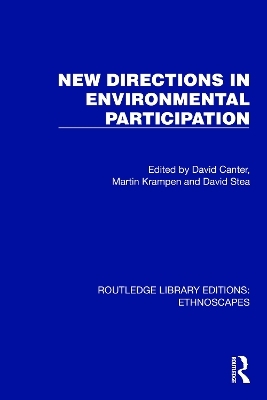
New Directions in Environmental Participation
Routledge (Verlag)
978-1-032-81646-3 (ISBN)
Originally published in 1988, reissued now with a new series introduction, New Directions in Environmental Participation was the third in a trilogy of books to open the series Ethnoscapes: Current Challenges in the Environmental Social Sciences. These three titles brought together specially commissioned contributions that cover much of the range of topics that the series as a whole would cover. Although the following volumes would not have the same format, the opening trilogy gave an overview of what was to come, while also providing a broad base for the future authors to build upon.
For this volume the editors chose to deal directly with current developments in environmental participation. This brings together contributions that range from studies of hands-on user participation to explorations on a much broader scale of the role we all play in shaping our environment. The role of communication, education and research in the participation process is a motif that is apparent throughout the contributions.
David Canter is Emeritus Professor at The University of Liverpool, UK. Having set up the first MSc in Environmental Psychology at The University of Surrey in 1972, he went on to establish the Journal of Environmental Psychology in 1980, editing it for 20 years. Soon after he founded the International Association of People-Environment Studies (IAPS). David has published widely on many aspects of human interactions with their surroundings; his 1977 book The Psychology of Place, being one of the most cited publications in the area. Martin Krampen (1928-2015) was a leading German semiotician. He worked in the field of visual semiotics and environmental perception, as well as being a professional artist. Over the course of his career Krampen held position at universities across North America and Europe teaching courses in social psychology, semiotics, and the psychology of design. He was the University of Waterloo's first full-time research associate, where he worked alongside Professor George Soulis to study the influence of design on industry. Krampen taught Visual Communication at Hochschule der Künste from 1977 until his retirement in 1993. David Stea is Professor Emeritus of Geography and International Studies at Texas State University and Research Associate with the Center for Global Justice in Mexico. As Carnegie Interdisciplinary Fellow at Brown University from 1964 to 1966, he developed the new field of Environmental Psychology and the related study of spatial and geographic cognition. David is a member of the editorial boards of a number of journals, the co-author or co-editor of several books and author of some 150 articles and book chapters on various subjects, including sustainable development and environmental issues in Latin America. In 1987 he was nominated for the Right Livelihood Prize (also known as the “alternative Nobel”) for his international work with indigenous peoples.
New Series Introduction to the Reissue David Canter and David Stea. Editors’ Introduction. Section One: Participation and Communication 1. Psychological Variables in Participation: A Case Study Euclides Sanchez, Karen Cronick and Esther Wiesenfeld 2. Designers’ Involvement in Design Education Martin Symes 3. Participation and Community: Transcultural Perspectives Joan Simon Section Two: The Use of Models in Participatory Placemaking 4. Participatory Planning and Design in Intercultural and International Practice David Stea 5. Active User Participation in the Housing Process Bruce Bentz 6. Environmental Modelling for House Planning Rod Lawrence 7. Modelling as Participation in a Botswana Village John Mason 8. Environmental Modelling: The View from Ecuador Susana Jacome Section Three: Present Challenges for the Future 9. Environmental Deterioration: A Historical (and Futurological) Perspective Johan Galtung 10. A Better World Not Eutopia Robert Sommer 11. New Life Styles and New Architecture Martin Krampen 12. Ambience or Environment: Or ‘What is the Correct View of Nature?’ Thure Von Uexkull. Brief Biographies of Contributors. Index.
| Erscheinungsdatum | 04.10.2024 |
|---|---|
| Reihe/Serie | Routledge Library Editions: Ethnoscapes |
| Verlagsort | London |
| Sprache | englisch |
| Maße | 156 x 234 mm |
| Gewicht | 548 g |
| Themenwelt | Geisteswissenschaften ► Psychologie ► Allgemeine Psychologie |
| Naturwissenschaften ► Biologie ► Ökologie / Naturschutz | |
| Naturwissenschaften ► Geowissenschaften ► Geografie / Kartografie | |
| Technik ► Architektur | |
| Technik ► Umwelttechnik / Biotechnologie | |
| ISBN-10 | 1-032-81646-5 / 1032816465 |
| ISBN-13 | 978-1-032-81646-3 / 9781032816463 |
| Zustand | Neuware |
| Informationen gemäß Produktsicherheitsverordnung (GPSR) | |
| Haben Sie eine Frage zum Produkt? |
aus dem Bereich


